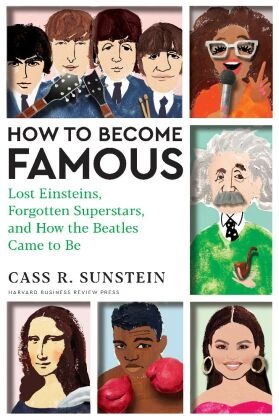How to Become Famous - Lost Einsteins, Forgotten Superstars, and How the Beatles Came to Be
| Verlag | Harvard Business Review Press |
| Auflage | 2024 |
| Seiten | 272 |
| Format | 16,4 x 2,2 x 24,4 cm |
| Gewicht | 565 g |
| Artikeltyp | Englisches Buch |
| EAN | 9781647825362 |
| Bestell-Nr | 64782536UA |
Fame is like lightning. Taylor Swift, Bob Dylan, Leonardo da Vinci, Jane Austen, Oprah Winfrey-all of them were struck. Why? What if they hadn't been?
Consider the most famous music group in history. What would the world be like if the Beatles never existed? This was the question posed by the playful, thought-provoking, 2019 film Yesterday, in which a young, completely unknown singer starts performing Beatles hits to a world that has never heard them. Would the Fab Four's songs be as phenomenally popular as they are in our own Beatle-infused world? The movie asserts that they would, but is that true? Was the success of the Beatles inevitable due to their amazing, matchless talent?
Maybe. It's hard to imagine our world without its stars, icons, and celebrities. They are part of our culture and history, seeming permanent and preordained. But as Harvard law professor (and passionate Beatles fan) Cass Sunstein shows in this startling book, that is far from the case. Focusing on both famous and forgotten (or simply overlooked) artists and luminaries in music, literature, business, science, politics, and other fields, he explores why some individuals become famous and others don't and offers a new understanding of the roles played by greatness, luck, and contingency in the achievement of fame.
Sunstein examines recent research on informational cascades, network effects, and group polarization to probe the question of how people become famous. He explores what ends up in the history books and in the literary canon and how that changes radically over time. He delves into the rich and entertaining stories of a diverse cast of famous characters, from John Keats, William Blake, and Jane Austen to Bob Dylan, Ayn Rand, and Stan Lee-as well as John, Paul, George, and Ringo.
How to Become Famous takes you on a fun, captivating, and at times profound journey that will forever change your perspective on the latest celebrity's "fifteen minute s of fame" and on what vaults some to the top-and leaves others in the dust.
Rezension:
Named one of "The 10 Best Business Books of 2024" by Forbes
"To probe the mystery of why some people become famous and others don't, Sunstein calls on compelling studies from experimental psychology and behavioural science." "...a thought-provoking read..." - Financial Times
"...he delivers a fascinating crash course on why some people-or bands or movies or works of art-become famous." - Kirkus Reviews
Advance Praise for How to Become Famous:
"What do the Beatles, Star Wars, Bob Dylan, and Shakespeare have in common? They are all extraordinarily famous. But why? That's the question that Cass Sunstein answers in this book, and the answer is so much more interesting, surprising, and counterintuitive than you can imagine. The book won't tell you how to become famous, but it will help you understand fame-and its sibling, success-in a radically new way. If you read and understand this book, the world will never look the same to you again." - Duncan Watts , Stevens University Professor and PIK Professor, University of Pennsylvania
"A book that could also be titled Tales to Astonish. Cass Sunstein looks, mouth agape, at examples of those on whom fortune has smiled, as well as at examples of those who have inexplicably been denied its favor, connecting the dots all the while. A fun, potent, and vital examination, and a reminder of the cultural responsibility we all share to pay attention." - Howard Fishman, author, To Anyone Who Ever Asks: The Life, Music, and Mystery of Connie Converse
"Who better to explain fame in the modern world than Cass Sunstein? In How to Become Famous, he gives us a tour de force of social scientific observation about the nature of fame, its mechanisms, and how it can end up unfairly distributed." - Tyler Cowen, Professor of Economics, George Mason University

